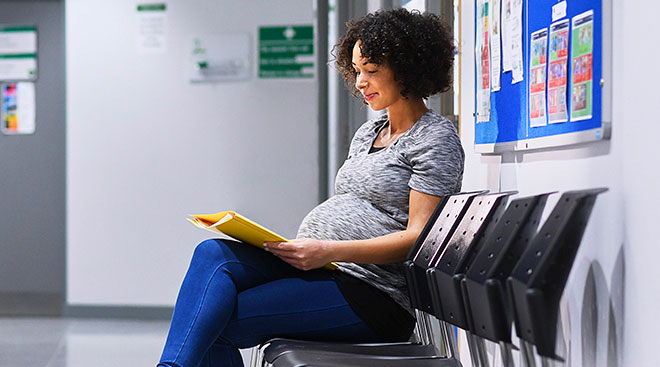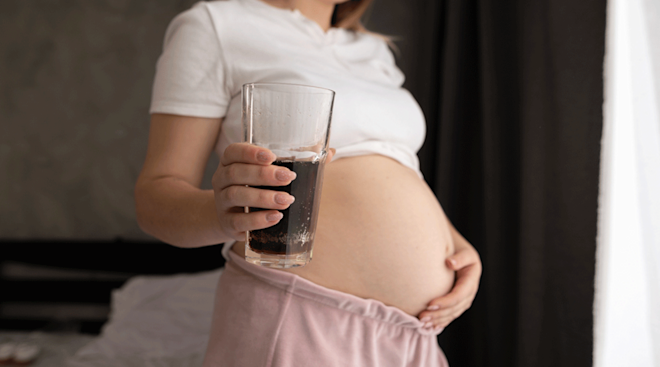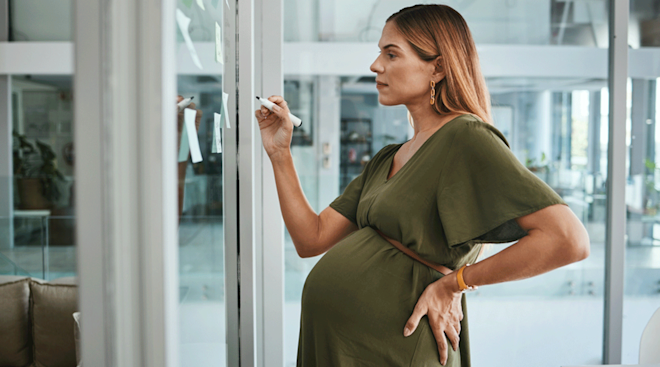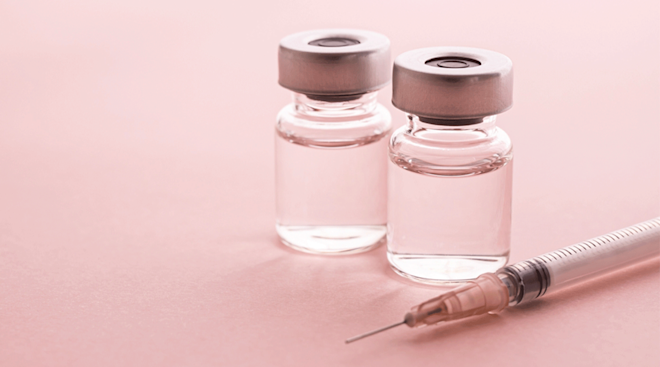Vaccines You Should (and Shouldn't) Get During Pregnancy
Whether you’re planning a pregnancy or currently expecting, you’ll want to brush up on which vaccines are recommended for moms-to-be, and which you should get well before you get pregnant to maximize your protection. “It’s important for pregnant women to be up to date on the recommended vaccines,” says Sara Twogood, MD, an ob-gyn at Cedars-Sinai Medical Center in Los Angeles. “The safety of these vaccines is well supported in the literature and the benefits are well established.” She assures patients that the vaccines given to pregnant women don’t contain live viruses, so you can’t get the infection from them. Here, a look at the vaccines moms-to-be may need—including why and when—according to the US Centers for Disease Control and Prevention (CDC).
There are a couple vaccines that the CDC encourages all pregnant women to get, to help protect both you and baby from dangerous diseases. If you have any questions about whether you should get them, speak with your doctor.
Tdap vaccine
Why you should get it: The CDC recommends that every pregnant woman get the Tdap vaccine, which protects against tetanus, diphtheria, and pertussis (aka whopping cough). Whooping cough can be life-threatening for newborns, and unfortunately, after seeing a sharp decline in cases over the years, it’s now back on the rise. About half of babies under 1 year old who get whooping cough need to be hospitalized, and up to 20 babies die from whooping cough each year in the US. The good news? “When the mom gets the Tdap vaccine, she builds up antibodies to pertussis, which cross the placenta and can help provide baby with a small amount of protection (antibodies) until the baby is old enough to receive the vaccines themselves,” Twogood says.
When to get it: Tdap can be administered at any point in pregnancy, but the CDC says the best time to get it is between 27 and 36 weeks of pregnancy, ideally closer to the 27-week mark to maximize protection for baby.
Flu vaccine
Why you should get it: Because of all the changes in your immune system, heart and lungs when you’re expecting, you’re more likely to get seriously ill from the flu during pregnancy. It can also increase the chances of premature labor. That’s why the CDC encourages all pregnant women to get vaccinated against influenza. The shot contains an inactive form of the virus, which is safe for pregnancy; a nasal spray of live attenuated influenza isn’t recommended during pregnancy. “The flu vaccine doesn’t guarantee no flu, but it can minimize the severity of the symptoms and sometimes prevent it altogether,” Twogood says. Plus, it’ll not only help protect you during flu season, but it’ll also protect baby for several months after birth.
When to get it: The flu vaccine can be administered at any point in pregnancy, but the CDC recommends getting vaccinated by the end of October, if possible, to better protect you before flu season is in full swing.
COVID-19 vaccine
Why you should get it: Studies have shown pregnant women who contract COVID-19 are at an increased risk for preterm birth and severe illness. While the vaccine is new and some currently only have emergency FDA approval, according to the CDC, the data available on vaccination does not show any safety concerns for pregnant women or their babies. In fact, both the CDC and the American College of Obstetrics and Gynecologists (ACOG) now recommend pregnant women get the vaccine, as evidence has consistently shown it to be safe and effective.
When to get it: The COVID-19 vaccine series does not contain a live virus and can be administered at any point during pregnancy. According to the ACOG, it can also be given simultaneously with other vaccines, including within 14 days of getting another vaccine, such as the flu shot and Tdap.
In addition to the Tdap, flu and COVID vaccines, there may be others that your doctor recommends based on your medical history and risk factors. Sit down with your primary care doctor, ob-gyn or specialist taking care of any pre-existing conditions to figure out if you’d benefit from additional vaccines.
Hepatitis B vaccine
Why you might need it: Hepatitis B is an inflammation of the liver, often caused by a virus. It can range from a mild illness lasting a few weeks to a serious, life-long illness that can cause liver damage, liver cancer and death. Moms-to-be who are at risk of contracting hepatitis B during pregnancy (having more than one sex partner during the past six months or having sex with someone who has Hep B, being treated for HIV or recently using injection drugs) should receive the hepatitis B vaccine, the CDC says. If you contract the Hep B virus, you can pass it to baby during delivery, who then has a 90 percent chance of developing chronic hepatitis B. If a blood test shows you’re not infected and you’re not at risk of getting it, you don’t need this vaccine.
When to get it: Talk to your doctor about getting tested for hepatitis B and whether or not you should get vaccinated. The series of vaccines is usually given in three doses over the course of six months. According to the CDC, limited data suggests the vaccine (which contains a noninfectious form of the virus) doesn’t pose any risk for baby.
Hepatitis A vaccine
Why you might need it: If you have a history of chronic liver disease or at risk for contracting hepatitis A, your doctor may recommend the hepatitis A vaccine. The safety of hepatitis A vaccination during pregnancy hasn’t been determined, the CDC says—but because the vaccine is made from an inactivated form of the virus, any risk to baby is thought to be low. Talk to your doctor to weigh the risk of vaccination against your risk for exposure to the virus.
When to get it: If you and your doctor decide you should get the Hep A vaccine, it’s usually given in two doses six to 12 months apart.
Meningococcal vaccine
Why you might need it: If you work in a lab, have certain medical conditions (like the lack of a functioning spleen) or are traveling to a country where you may be exposed to meningococcal disease, a severe and possibly fatal bacterial infection, your doctor may recommend the meningococcal vaccine. Few studies have been conducted on the safety of the MenB vaccine during pregnancy, so vaccination should be put off unless you’re at increased risk and you and your doctor decide the benefits of the vaccine outweigh the risks.
When to get it: Speak with your doctor to determine if and when you should get this vaccine.
Even before becoming pregnant, make sure you are up to date on all your vaccines. This will help protect you and your child from serious diseases—especially because once you get pregnant, it may not be safe to get certain vaccines, including those that protect against measles, mumps, rubella and chickenpox. “If a pregnant woman is exposed to these infections during pregnancy and isn’t immunized, the virus can have detrimental effects on the developing fetus,” Twogood says. “For these reasons, I check for rubella and varicella immunity at a preconception visit and administer the vaccine if the patient doesn’t show immunity.” Keep in mind that it’s generally best to wait at least a month before getting pregnant after receiving these vaccinations.
MMR vaccine
Why you might need it: The MMR vaccine protects against measles, mumps and rubella. Rubella is a contagious disease that can be very dangerous if you get it while pregnant, potentially causing miscarriage or serious birth defects. However, since the MMR vaccine contains a live virus, it’s not safe to get during pregnancy.
When to get it: Most women were vaccinated as kids, but if you aren’t up-to-date on your vaccines (you can also get a blood test to see if you’re immune), you’ll need an MMR vaccine before you get pregnant. If you get the MMR vaccine, it’s important to wait at least 28 days before getting pregnant.
Chickenpox vaccine
Why you might need it: Chickenpox, or varicella, is a highly contagious viral infection that causes an itchy, blister-like rash on your skin. Many people get chickenpox or the chickenpox vaccine as children, but adults who haven’t had either should get the vaccine, the CDC says. However, because the effects of the virus on an unborn baby are unknown, pregnant women should not receive the vaccine.
When it get it: The vaccine is given in two doses at least 28 days apart and is best to get after you give birth, the CDC says. If you get it before pregnancy, avoid becoming pregnant for at least one month after each injection.
HPV Vaccine
Why you might need it: HPV is the most common sexually transmitted infection in the US. There are several different types of HPV, some of which can cause health problems like genital warts and cancers. The CDC recommends that 11- to 12-year-olds get two doses of the vaccine to ward against cancers caused by HPV, but if you weren’t vaccinated when you were younger, women up to 26 years old can get a catch-up vaccine. It’s not, however, recommended for pregnancy.
When to get it: You can get the three-dose series of the HPV vaccine before or after pregnancy.
About the expert:
Sara Twogood, MD, FACOG, is an ob-gyn at Cedars Sinai Medical Center in Los Angeles. She’s also the author of Ladypartsblog.com, which covers topics relating to fertility and pregnancy, and the founder of FemEd, a program designed to empower females through health education.
Please note: The Bump and the materials and information it contains are not intended to, and do not constitute, medical or other health advice or diagnosis and should not be used as such. You should always consult with a qualified physician or health professional about your specific circumstances.
Plus, more from The Bump:
Navigate forward to interact with the calendar and select a date. Press the question mark key to get the keyboard shortcuts for changing dates.





















































